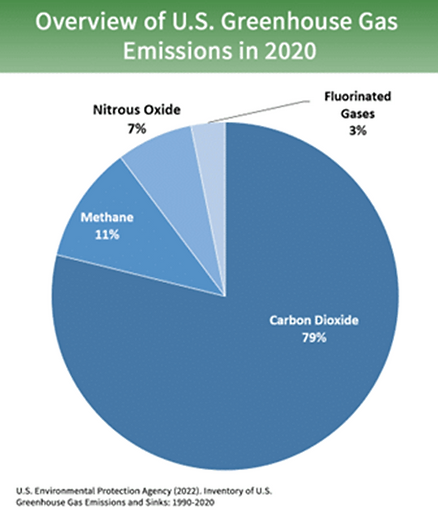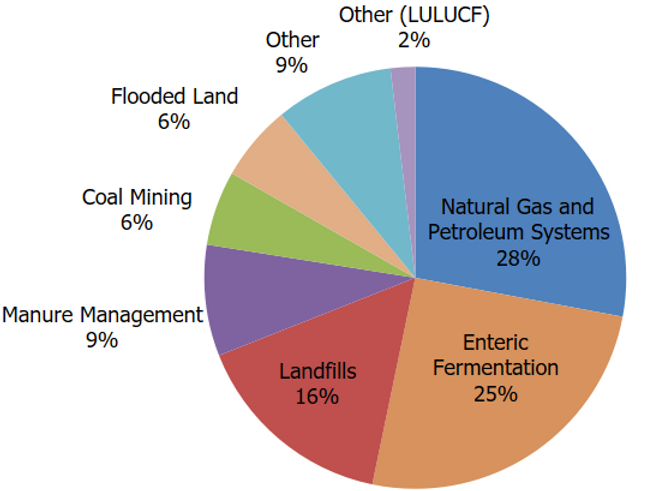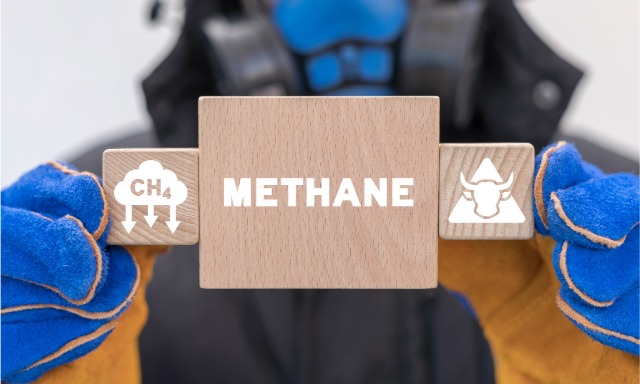Greenhouse gases are atmospheric gases that raise the surface temperature of planets such as the Earth. What distinguishes them from other gases is that they absorb the wavelengths of radiation that a planet emits, resulting in the greenhouse effect. We need some of these gases or the planet would be too cold to live on. For such an important factor in our ability to thrive on this planet, too few of us know what these actually are, most of us just equating them with carbon dioxide.
So, what are these gases that contribute to the warming of our earth? Major greenhouse gases include carbon dioxide, methane, nitrous oxide, and various fluorinated gases (including hydrofluorocarbons, perfluorocarbons, sulfur hexafluoride, and nitrogen trifluoride, which are synthetic, powerful greenhouse gases that are emitted from a variety of household, commercial, and industrial applications and processes). Carbon dioxide is widely reported as the most important anthropogenic greenhouse gas because it currently accounts for the greatest portion of the warming associated with human activities. It is commonplace to hear about all the ways in which we need to cut our carbon footprint. It is rare, however, to hear discussion of any of the other gases that make up the greenhouse gases that are part of this problem.

This singular focus on CO2 would make sense if carbon dioxide and methane behaved in the same way because there is so much more of it (approximately 10 times more). But the reality is that these two gases have heat trapping properties making methane a far more important part of this equation than one might first assume.
The IPCC and others recognize methane as having 28 times more warming potential than CO2 for the same mass of emissions. That is if you are measuring over a 100-year period. However, if this same comparison is done over a 20-year period then the ratio is closer to 80 times more warming. This is because methane in the atmosphere has a 12-year life and CO2 has a 1000-year life. So, in the long run, CO2 is more important. However, in the short-term methane is more important. If we want to slow the exponential curve of the climate crisis prioritizing methane makes the most sense. In fact, Project Drawdown held a webinar this week entitled The Business Case for Curbing Methane (video to be made available here) and in it they stated that efforts to curb methane emissions is “an important “emergency brake” that holds higher-than-average potential for helping limit warming to 1.5 °C if implemented quickly”.
The reason I can claim that methane needs to be prioritized is understanding the climate crisis through a systems lens. Allow me to explain. We are currently discussing the problem of global warming as though it were on a linear trajectory getting a little warmer each year. This means that we are talking about lessening emissions as though a 50% reduction today is the same as a 50% reduction in the future. This is a dangerous misunderstanding as it is what allows us to make goals and pledges for decades from now. The reality of our situation is that we are on an exponential growth curve with reinforcing feedback loops accelerating the rate of warming each day. Because this is true, the more we can slow the trajectory now, the bigger the impact we will have in the long run. So, the more we can stop the warming immediately, the more we avoid setting off the resulting reinforcing loops that speed that warming. It is effectively buying us some much-needed time to deal with the other greenhouse gases, namely decarbonizing our infrastructure, which can’t happen overnight.
The exciting news for us here at Common Earth is that methane seems to be finally becoming a much-needed part of the climate discourse.
For example, this video which highlights one the greatest marketing jobs ever done, which was to rebrand methane as natural gas.
And this satiric video from the campaign Hot & Toxic encouraging people to divest themselves of their gas stoves.
But our “natural gas” infrastructure is still infrastructure which, as we already discussed, can be slow and costly to change.
What we can change overnight is our eating habits. This is great news for the climate because of the huge contribution to methane emissions that our consumption of beef and dairy products make. As you can see from the graph below, when enteric fermentation (cow burps) and manure management are combined you are at well over 30% of anthropogenic methane emissions. This is an enormous opportunity for us to exercise our agency and divest ourselves from the sense of hopelessness we can sometimes feel in the face of the climate catastrophe we are creating.

Corporate Knights published an article recently which is essentially a roadmap for how the world can reduce emissions from food partly by redirecting the subsidies given to the meat and dairy industries.
And the cattle industry is taking notice. The greenwashing has commenced around climate- friendly meat and dairy options which was addressed in a recent article from Heated where they warn against falling for this rebrand.
Remember those pesky reinforcing loops we talked about earlier that are putting us on an exponential warming curve? Well, the good news is that we can have exponential growth of something that we want. What if some of us could start experiencing agency in creating meaningful change that creates hope and solidarity that feeds back on itself to creates more meaningful change? What possibilities could emerge from that? I for one am eager to find out and have dramatically changed my diet and that of my family as a result. It feels great. I hope you join me.



